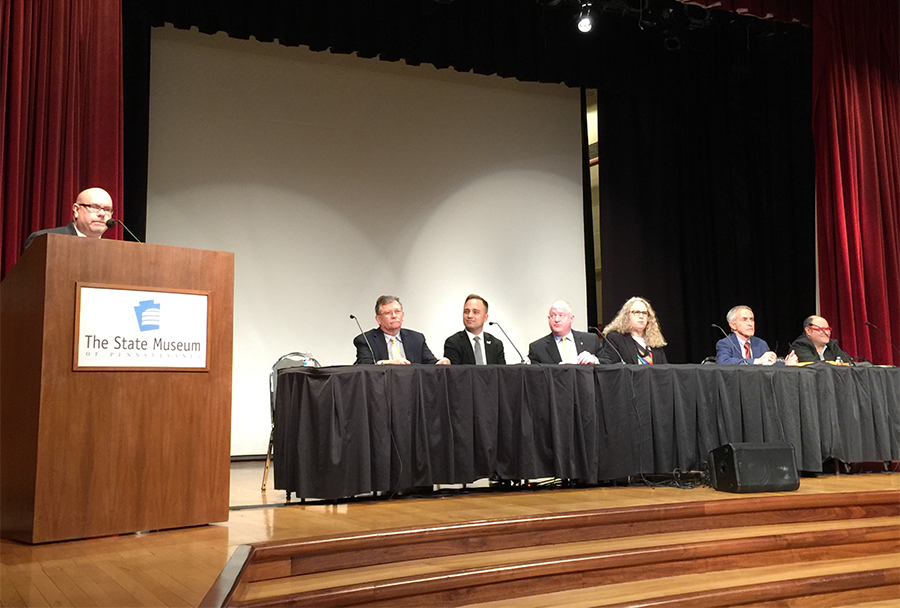In 1976, Marilyn Hewitt hadn’t yet come out as a lesbian to her parents or sisters, much less colleagues at work with the Commonwealth of Pennsylvania. But then a friend tapped her to join the Council for Sexual Minorities, newly created by Gov. Milton Shapp.
“I had a decision to make,” Hewitt told a crowd of about 70 people gathered April 12 at the State Museum in Harrisburg. “After weighing everything, I decided to accept the appointment. I decided to come out and take that weight off my own shoulders.”
She said the first thing she did was tell her boss about joining the council.
“I knew he couldn’t fire me because the governor said so,” Hewitt said, referencing Shapp’s executive order banning employment discrimination based on sexual orientation. It was the first time an order of that kind had been enacted in Pennsylvania.
Subsequent governors reauthorized the nondiscrimination executive orders. Gov. Ed Rendell added gender identity and presentation as a protected class in 2003.
The audience applauded in approval during the more-than two-hour presentation that celebrated the 40th anniversary of the founding of the Council for Sexual Minorities. The council operated until 1987, with LGBT people from across the state and representatives from eight major state agencies meeting regularly. Gov. Bob Casey, Sr., neglected to reappoint council members when he took office.
“I’m sure my coming out had some impact on my coworkers,” Hewitt continued. “I don’t think they’d ever thought of a gay person before, but they already liked me. That’s the most important thing. Make people get to know you and it changes them completely.”
Fifteen others spoke at the 40th-anniversary event, including Pennsylvania Physician General Dr. Rachel Levine; Ted Martin, executive director of Equality Pennsylvania; Mark Segal, PGN publisher; Dr. Tony Silvestre, chairman of the council throughout its existence; and Jason Landau Goodman, founding executive director of the Pennsylvania Youth Congress.
Barry Loveland, chairman of the LGBT Center of Central Pennsylvania History Project, took the lead on organizing the event and the corresponding exhibit, “We’re Here: Pioneering LGBT Rights in Pennsylvania,” which is on view until Oct. 30 at the State Museum, 300 North St., Harrisburg.
Louie Marven, executive director of the LGBT Center of Central Pennsylvania, said he felt inspired to see the records indicating strong LGBT organizing in the rural center of the state.
“This record is a reminder to me and the people who use the center that our community is everywhere,” Marven said. “There are role models in our history.”
Silvestre shared the accomplishments of the Council for Sexual Minorities. He gave credit to Shapp, calling the former governor “ahead of his time” for continuing to support the gay-rights movement even amid pushback from the legislature.
Silvestre said the council was instrumental in the ultimately successful efforts to repeal sodomy laws in Pennsylvania and increasing AIDS funding with the Special Pharmaceutical Benefits Program, which still functions today.
“We have yet to accomplish Gov. Shapp’s goals of making services available to all LGBT people,” Silvestre said, noting work needs to be done to make things like aging services and public schools more LGBT-inclusive.
Sam Deetz, a former council member, said he’s proud of the council’s work of increasing the visibility of gay people.
“Back in those days, most gay men I knew lived two lives,” Deetz said. “One on the weekends and holidays, where they could interact socially with people they were comfortable with. Then during the week, it was going to work and monitoring how they spoke and who they spoke about.”
Levine and Martin talked about Gov. Tom Wolf’s two executive orders, which he signed last week to prohibit discrimination based on sexual orientation and gender identity in state employment and state contracting.
“More LGBT Pennsylvanians are safer from discrimination than last week,” Martin said, noting the orders covered 73,000 state employees and, for the first time in state history, those working in 3,525 state contracts and 9,000 agency grantees.
Martin said recent polling indicates more than 78 percent of Pennsylvanians support nondiscrimination legislation and called on the legislature to pass the Pennsylvania Fairness Act.
“It is time for us to move beyond partisanship and recognize that this is a serious issue that affects the good people of our state,” he said. “Nondiscrimination is an issue tailor-made for common ground, common decency and common sense.”

